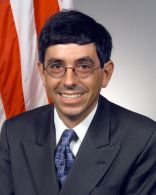Expanding the Envelope: Challenges and Opportunities in Aerospace Research
Mark J. Lewis
TUESDAY: March 6, 2012 2:00 P.M. in the H.J.E. Reid Auditorium.
(video) within the Langley firewall only
Abstract
The Aerospace engineering field experienced tremendous success throughout the 20th Century. It was 35 years from the Wright brothers to the first jet engine, and only 44 years to supersonic flight; similarly, rocketry progressed from the first experiments of Robert Goddard to Neil Armstrong walking on the Moon a mere 43 years later. Since the later part of the 20th Century, there has been a general perception that the aerospace field is “maturing” with most basic systems concepts worked out, airplane designs essentially solidified, and space vehicles merely embellishing what has already been done. Yet, there is an incredibly exciting frontier of aerospace research ahead of the current generation of engineers. This talk will survey some of the most pressing problems and opportunities in the aerospace field- from the need for environmentally responsive aircraft systems, alternate energy solutions, and demands on future air traffic control, to the challenges associated with ubiquitous unmanned systems. The promise of future aerospace systems, from highly-efficient aircraft to low-cost space launchers, and even vehicles that will fly at many times the speed of sound, will be explored.
Speaker
 Dr. Mark J. Lewis is the Willis Young, Jr. Professor and Chair of the Department of Aerospace Engineering at the University of Maryland. From 2004-2008 he was on leave from campus to serve as the Chief Scientist of the U.S. Air Force. He is also Immediate Past President of the American Institute of Aeronautics and Astronautics (AIAA), the foremost technical society of aerospace engineers.
Dr. Mark J. Lewis is the Willis Young, Jr. Professor and Chair of the Department of Aerospace Engineering at the University of Maryland. From 2004-2008 he was on leave from campus to serve as the Chief Scientist of the U.S. Air Force. He is also Immediate Past President of the American Institute of Aeronautics and Astronautics (AIAA), the foremost technical society of aerospace engineers.
Dr Lewis obtained his professional degrees at the Massachusetts Institute of Technology, where he received a Bachelor of Science degree in aeronautics and astronautics and Bachelor of Science degree in earth and planetary science (1984), Master of Science (1985) and Doctor of Science (1988) in aeronautics and astronautics.
A faculty member at Maryland since 1988, Dr Lewis has been teaching and conducting basic and applied research in the fields of hypersonic aerodynamics, advanced propulsion, space vehicle design and optimization. His work has spanned the aerospace flight spectrum from the analysis of conventional jet engines to entry into planetary atmospheres at hypervelocity speeds, with a specialty in the integration of high-speed engines with highly-efficient airframes. Dr Lewis is the founding director of a NASAsponsored multi-university Institute, supporting research in space access and launch vehicle technologies.
As the longest-serving Chief Scientist in Air Force history, Dr Lewis served as a member of the Air Staff and principal scientific adviser to the Chief of Staff and Secretary of the Air Force, and providing assessments on a wide range of scientific and technical issues affecting the Air Force mission. In this role, his primary areas of focus included energy, sustainment, long- range strike technologies, advanced propulsion systems, and workforce development.
Dr. Lewis is the author of more than 280 technical publications, and has been adviser to more than 60 graduate students. He is active in national and international professional societies, with responsibilities for both research and educational policy and support. In addition, he has served on various advisory boards for NASA, the Air Force, and DOD, including two terms on the Air Force Scientific Advisory Board, where he has participated in six summer studies and chaired a number of science and technology reviews of the Air Force Research Laboratory.
A recipient of both the Meritorious Civilian Service Award and Exceptional Civilian Service Award, Dr. Lewis was also the 1994 AIAA National Capital Young Scientist/Engineer of the Year, received the IECEC/AIAA Lifetime Achievement Award, and was named an Aviation Week and Space Technology Laureate in 2007. He is a Corresponding Member of the International Academy of Astronautics, a Fellow of the American Society of Mechanical Engineers, a Fellow of the American Institute of Aeronautics and Astronautics, and a President’s Fellow of the Royal Aeronautical Society.